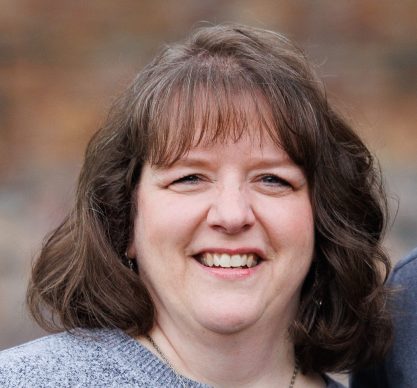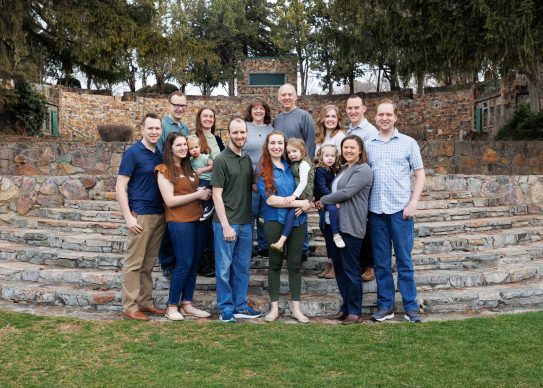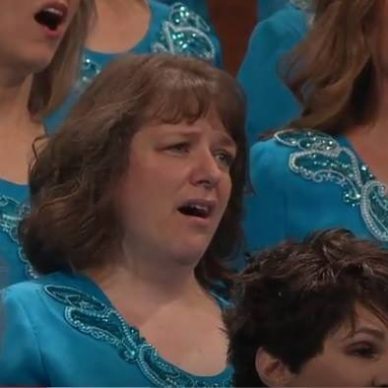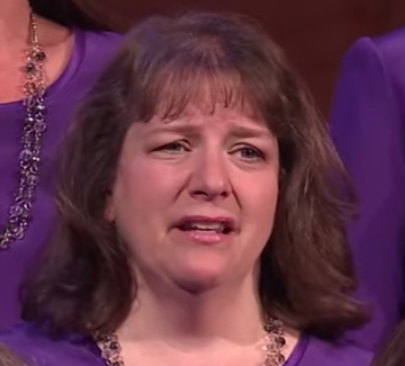Rebecca Cheney grew up with music and wanted to sing in the Tabernacle Choir for as long as she can remember. She shared her audition process and some of her experiences as a member of the Choir.
Could you tell us about your growing-up years and how music factored into that?
 I grew up in a military family – my dad was in the Army, so we moved a lot. I met my husband in Germany when we were teenagers because his dad was in the Army too. We got married when we were at BYU and had five boys. All five are married and we have three granddaughters.
I grew up in a military family – my dad was in the Army, so we moved a lot. I met my husband in Germany when we were teenagers because his dad was in the Army too. We got married when we were at BYU and had five boys. All five are married and we have three granddaughters.
Music was always a part of my life. My mom and my grandma taught me to play the piano from when I was about seven. My mom went by a different name when she was our piano teacher – she was Mrs. Twiddleberry, so we would show her a little more respect during lessons, I guess. The year I was eight, my dad was stationed in Korea so we lived in Oregon next door to my grandparents. We recorded cassette tapes for my dad, and then he would record and send them back because long-distance phone calls were so expensive. We sang to him on the tapes, so we have recordings of us as little kids singing to our dad. My brother digitized them and I have the files now.
There was always singing in our home, always music. Music was just always part of what we did – singing in Primary, performing in ward talent shows, singing in ward and stake choirs, and musicals and choirs at school. I took voice lessons during high school. At BYU, I majored in choral music education. So it was always a part of my life and I feel like it’s part of who I am. It’s just me. I don’t know who I would be without it.
I did student teaching at the end of my degree, but other than that, I was a stay-at-home mom – that was what I wanted to do, and I was really blessed that I could do that for so long. I had a few piano students over the years, and I directed ward and stake choirs at different times. I also volunteered with the orchestra program at my kids’ elementary school. I taught all my kids piano lessons.
Were you also Mrs. Twiddleberry?

Rebecca Cheney with her family
I wasn’t. I should have been – maybe it would have been better. I taught them under duress sometimes. They all participated in band and orchestra at school. We were always singing. I’ve always sung to my children, and some were in choir in junior high and high school. Some took voice lessons at different times. I made them go to each other’s concerts, which they didn’t appreciate, but it’s important to support each other. So we’ve been to lots and lots and lots of concerts over the years. Two of my sons were in the concert choir and Men’s Chorus at BYU, and I have a daughter-in-law majoring in vocal performance. Music is just who we are – it’s part of our identity.
What brought you to the point of joining the Tabernacle Choir?
You have to feel called to do it, I think, because it’s a huge time commitment. I always felt like I was supposed to be in the Tabernacle Choir but for a long time, I had a hard time believing it would ever happen. I definitely had imposter syndrome – I never felt like I had the ability or the talent. But the Lord puts people in your path at the right time. My youngest son was speech-delayed as a toddler, and I met a woman who worked through the schools to help identify preschool children who needed special services. I found out she was in the Choir and that changed everything for me.
It took a long time and a lot of work, but that was the first step – I knew somebody in the Choir and we developed a friendship. We started small with voice coaching and she really helped me build up my confidence. She encouraged me to join a community choir, which I did around 2007, and sang with them for five or six years. The director of that choir was vocal faculty at Utah Valley University and he started teaching me voice lessons. I learned so much because it was something I wanted, and I was really focused on that goal. The experience of voice lessons and studying and practicing was very different from when I was a student at BYU – I was much more focused and dedicated, and I tried a lot harder. It was still three or four years before I felt ready to audition.
That’s a lot before you even began the official audition.
My first Music and the Spoken Word was in March 2013. April 2013 General Conference was my first conference, and I sang in two sessions. My first audition was in July 2010 and I auditioned three times. It’s been over ten years so the audition process is probably different now, but it was very intense. This is what I had to do:
There was an application to fill out and my bishop had to sign it. The application asked things like, “What are you doing to sing right now? How are you developing your voice?” I had to record myself singing a hymn with no accompaniment. I touched the piano with the opening note, sang the hymn, and touched the note again at the end so they knew if I was in tune. I sent a cassette tape in 2010, which was already archaic by then. I got a letter back saying, “Thank you for auditioning, but no thanks.” The letter also had a checkbox list of things like sound production and vowel shape and technical vocal skills, and other skills to work on – mine said something about breath flow and breath support. It was hard to get a No but I never felt hopeless. When the timing is right for the Lord, then it will happen. I held on to that. A year later, 2011, I went through the same process – sent in the audition on another cassette, and got another No.
In 2012, I decided to audition again. I was still singing in the community choir but hadn’t been taking voice lessons for a while, so I talked to the professor at UVU and we did some brush-up lessons. That year, I recorded myself on a digital recorder and made a CD. I did different takes of everything and then listened to figure out which ones to send in.
Every time I auditioned, I made it such a matter of prayer. I wanted this so much and felt like it was the right thing. I made the third audition recording, put the CD in the envelope, addressed it, and was getting ready to go to the post office to mail it. I had a feeling, “You need to switch a couple of the files.” So I remade the disc and sent it off. I don’t know if it made a difference but it was meaningful to me.
I got a letter saying, “We invite you to take the musical skills assessment exam,” which was the next phase of the audition. It was a three-hour exam on a Saturday morning in the Tabernacle.
The first part was all listening with questions like, “Is this a minor chord? What is this interval? Look at a musical phrase on paper, and mark where it was different from what we were listening to.” I thought, “Okay, I can do this.” By the end, I was ready to crawl under the table and put up a white flag of surrender. The last piece had no music in front of us – they played a twelve-measure phrase that had really weird melodies and strange rhythms, then they played it a second time and we had to mark which measures were different, but with no sheet music. The second part of the test was written and was all music theory. I had studied and felt like I aced that part of the test, but the listening portion, I thought, “There’s no way.”
The next day was the Brigham City Temple dedication, which was broadcast to church buildings around Utah. Before it started, they showed the Tabernacle Choir as the prelude music, and I turned to my husband and said, “Every person up there on the screen passed that test. So maybe there’s hope that I passed it too.” It took about a week to get the results and I passed it.
Phase three was a face-to-face audition in October 2012. Being a soloist has never been my strength and I have terrible stage fright, so my husband gave me a priesthood blessing. I’d gone to the temple, and I went to Temple Square early to the north Visitor’s Center where the Christus statue was. I sat there and just prayed, and it helped me be more centered when I went to my audition.
I was interviewed by the choir president and manager, asking things like, why did I want to be in the Choir, and making sure I understood the time commitment and expectations. Then I went to another room to sing for the directors, Mack Wilberg and Ryan Murphy. That day, Bonnie Goodliffe was the accompanist for the audition – I told her my hymn and the key, and she just played it with no music. People are amazing. Who do I think I am, going in there and thinking I could audition? But the first thing Brother Wilberg said was, “I want you to know that we’ve prayed for your success, so you can relax.” I don’t know why he said that to me, but he did, and it really helped. I sang my hymn and a lot of vocal exercises, and did a lot of sight reading – I sang a hymn I’d never seen before. Bonnie played all the other parts on the piano, and I had to sing the soprano line written on the page without hearing it. There were musical phrases with difficult intervals to see how I made the jumps, and how quickly I could learn the music. In the Choir, we have to be able to pick up a song and sing it after only a couple of times through.
It took about three weeks before I got my letter in the mail, which was excruciating. I basically met the mailman at the door because I’d been waiting every day. It said, “Dear Sister Cheney, Congratulations.” That’s all I saw and I lost it. I was bawling, I almost fell to the floor. Daryn was there, and he picked me up. The kids were all downstairs probably thinking, “What in the world is happening to Mom?”
I was invited to join Temple Square Chorale, and we met twice a week. The chorale is the training choir, and we also had a class to prepare us to be part of the Choir – we learned about vocal production, how the Choir works behind the scenes, got fitted for the wardrobe, all of that. After four months, I got a letter that said, “You are called to serve in the Tabernacle Choir.” We’re all set apart and the title of our calling is Musical Missionary.
Wow! The Choir always sounds amazing, and now I know why! What’s your routine now?

Rebecca Cheney
Our rehearsal schedule is every Thursday night, and every Sunday morning is Music and the Spoken Word. We rehearse early on Sunday morning, do the broadcast, and most of the time we have another rehearsal after. We just stay in the seats and keep going. We recently performed Elijah with the Utah Symphony – it’s an oratorio by Mendelssohn. We work on that during the second rehearsal, or new pieces we’ve never sung on Music and the Spoken Word.
I learn the music at home so we don’t have to spend time learning parts in the rehearsals. If you count the time I spend driving to and from Salt Lake, at Choir, and rehearsing at home, it’s 12 to 17 hours a week. If there’s a big concert coming up, we meet multiple days a week so it could be 30 to 40 hours. During the Christmas concert week, we are there every day except Monday. Luckily that’s only a few weeks a year because I don’t know how anybody could do that all the time. It’s a huge sacrifice but there are so many blessings.
What is your favorite thing about the Choir? What’s a favorite piece of music?
This is the hardest question to answer. The first thing that comes to mind is the friendships I’ve made. The people in the choir are just regular people that are amazing. I’ve met the most incredible people that I never would have crossed paths with any other way.
The music we sing is so fabulous, some of the arrangements from Mack and Ryan. They bring music to life in a different way. A few years ago, we sang “Dear to the Heart of the Shepherd” in General Conference – that’s never been my favorite, but it was a new arrangement by Mack and it changed the whole song for me. It was just stunning. It’s such a privilege to sing their music with favorite hymns.
The Christmas concert with the Sesame Street characters was my second Christmas and one of my favorite moments. It was so fun. We rehearsed with the guests, and Big Bird came walking out and I started bawling my eyes out. How did I get here – that’s Big Bird. It took me back to when we were eight years old and was such an out-of-body experience. That concert was so fun.
Richard Elliott’s arrangement of “Let Us All Press On” is one of my favorites. “It is Well With My Soul,” arranged by Brother Wilberg. We always sing “Angels From the Realms of Glory” at the end of our Christmas concerts – the words are so powerful in the last verse. We sing one called “Love Divine, All Loves Excelling” by Charles Wesley. Brother Wilberg did the musical setting and it’s stunning.
We sing music that by its very nature brings the Spirit because we’re singing about the Atonement, or the peace the Savior can bring into our lives, or faith, things where the Spirit is always there. I have no doubt the Lord is part of this work. We’re a very important missionary function of the Church, and He is part of what we are meant to be doing. The Spirit is what makes some of these songs so powerful.
Last year in a General Conference, we sang “Brightly Beams Our Father’s Mercy” – the last verse says, “Trim your feeble lamp, my brother, some poor sailor tempest tossed, trying now to make the harbor, in the darkness may be lost.” Singing that and testifying of the lower lights burning, thinking about the power of being light for somebody else – even our little tiny light makes a difference.
There’s something about General Conference that is different from anything else we do. We always have the Spirit with us. The Spirit always comes. But in General Conference, it’s palpable.
How do you sing when you’re ready to cry? I can’t.
I cry. I don’t want to sound like this happens every week, but sometimes angels come and sing with us. There’s just no doubt. There have been times when everybody is bawling their eyes out, and you listen to the choir and the sound is incredible. We’re thinking, “Where’s that sound coming from? Because my voice doesn’t sound like that.”
At Elder Richard G. Scott’s funeral, we sang “Come, Thou Fount of Every Blessing” and when we got to the last verse, the volume of the number of people singing was twice as big as the rest of the song. You hear people talk about the rush of the Spirit and that’s what it felt like – it came from behind me and this huge wall of sound washed past me. That wasn’t just the people in the choir loft. That was a lot more than us testifying. It’s so amazing to me, and such a testimony that we’re doing the Lord’s work.

Rebecca Cheney
It’s been ten years and I still think, “How in the world did I get to do this?” It can be really hard when I’m in the trenches with a busy week, learning music and memorizing. But it’s like that with every calling, right? Mack always tells us, if we are prepared, then the Spirit can come. If I am prepared, if I have memorized my music, I am much more open to feeling and sharing the Spirit when I’m singing because I’m not wrapped up in the minutiae of what’s my next word? What’s the next line? When I’m prepared, I can really enjoy the process. Once I’ve got the nuts and bolts down, I can enjoy the experience of performing it.
I don’t know what it is about music. There’s something celestial about it. It had to be part of our premortal existence. There’s something about it that drives messages into your heart. I can feel it sometimes in my whole body, and you feel that your spirit is being fed. Listening and absorbing rather than expending the effort to sing is the same idea of attending a concert – you’re not necessarily participating in the music yourself because you’re not performing it, but you’re still getting the lift that comes from good music.
Within the experience of being in the Tabernacle Choir, how have you grown closer to our Heavenly Parents and the Savior?
I’m a different person now than when I joined the Choir. There have been very difficult things in my personal life over the last ten years, and Choir is always a refuge, kind of like going to the temple. It’s a place I can go when I need a lift, and I’m going to feel something there.
I found a couple of quotes that I want to share. Boyd K. Packer said, “A testimony is found in the bearing of it.” Because of the nature of what we do, week in and week out, I’m up there testifying of the truth of the gospel and bearing my testimony every single Sunday. That has strengthened me so much. I have learned how the Spirit speaks to me. President Nelson has said to learn how we Hear Him and really develop that skill. Choir has made all the difference. While on the break from the COVID pandemic, it was so difficult because I missed that connection. I get a connection straight to heaven. It’s not all the time but it does come.
This quote is from J. Reuben Clark: “We get nearer to the Lord through music than perhaps through any other thing except prayer.” I think that’s why I get such stage fright – I’m sharing what’s in my heart. Singing is so personal. If I have a solo, my instrument is me, it’s my body. Playing the piano for people doesn’t bother me or make me nervous but singing feels like I’m expressing a part of my deepest self. That has brought me so much closer to the Savior, to both of our Heavenly Parents. There have been times when I’ve felt the influence of Heavenly Mother in what we’re singing, in a way that I wouldn’t feel any other way. It’s been such a blessing for my testimony.
At A Glance
Name: Rebecca Cheney
Age: 51
Location: Orem, Utah
Marital History: Married to Daryn for almost 31 years
Children: 5 boys, all married to wonderful women. 3 granddaughters
Occupation: Stay-at-home mom for 25 years, 1st grade Title 1 Aide for the past 5 years
Convert to the Church: Raised in the Church
Schools Attended: Bachelor of Music in Choral Music Education from BYU, Dec. 1994
Languages Spoken At Home: English
Favorite Hymn: This is like picking a favorite child! Today it might be I Know That My Redeemer Lives (in the current hymnbook), Come, Thou Fount of Every Blessing (from the old hymnbook), or It Is Well With My Soul (not in our hymnbook)
Website or Social Media You Would Like Featured::
Interview Produced By: Trina Caudle
